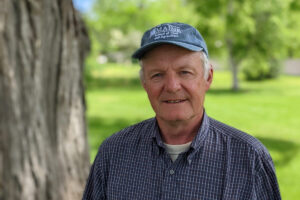Jan 9, 2024Potato breeding pioneer Porter retires after 38 years at UMaine
For Greg Porter, one potato highlights a satisfying career. Porter, an Aroostook County native, officially retired Dec. 31 after 38 years at the University of Maine.
A professor of agronomy, crop ecology and management, he most recently led the potato breeding program, which has been instrumental in developing new strains of potatoes tailored to Maine fields.
The Caribou Russet emerged in 2016 from years of research and testing at Presque Isle’s Aroostook Farm and exploded into markets as one of the most successful new varieties in recent years.

Porter, who lives in Bangor, is proud to have been part of the team that developed the variety.
The Caribou Russet has become one of the 15 top varieties grown in the U.S. because it produces high yields, tolerates stress well and has good quality both for the fresh market and for processing into chips and french fries.
“The Caribou Russet is our biggest success from our breeding program,” he said. “One of the most gratifying parts of my career is to have been able to work effectively with so many team members [and] to have that result in such a success as the Caribou Russet.”
Now a professor emeritus, Porter plans to pursue things his busy schedule didn’t allow, like hiking, fishing, gardening and more time with family.
And the man who grew up on a Washburn farm and has spent decades steeped in potatoes will of course keep tabs on the industry.
Porter studied soil science at UMaine. He originally planned to farm with his father, Richard, and brothers Rick and David, but in the financial crunch of the 1970s and ’80s the farm couldn’t support all three brothers, he said. Older brother Rick continues Porter Farms with his son Matt.
Porter joined UMaine’s Orono faculty in 1985 as an agronomist. Dr. Alvin Reeves, based at the Aroostook Farm, was the potato breeder, he said.
Porter spent a lot of time in Aroostook County, researching crop rotation, soil and nutrient management, irrigation, potato variety development and trial crops. Barley, wheat, oats and cover crops were part of his expertise until 2007, when he took over the potato breeding program.
His research was closely tied to growers’ needs and interests, which made it interesting, Porter said. He enjoyed working with people from all areas of agriculture.
“You have to have a group of people with different expertise,” he said. “That collaborative work is very important, because you can’t develop a new potato variety without a lot of help.”

Plant pathologists, agronomists, stakeholders, growers and even processing companies like McCain are often involved. Those who provide grants are equally important, such as the University of Maine, the Maine Potato Board, United States Department of Agriculture and the national potato group Potatoes USA, he said.
For his work in pioneering new varieties, the Maine Potato Board gave Porter its inaugural Maine Potato Industry Recognition Award in July.
“I think Greg has always had the respect and support of the industry, especially growers,” Maine Potato Board Executive Director Don Flannery said. “His dedication and hard work on behalf of the industry have been phenomenal.”
The Caribou russet made the biggest change in Maine’s potato industry that Flannery has seen in his lifetime, and has benefited growers and processors across the country, he said.
Porter was successful not only because of what he did, but because he helped growers understand and apply new things, Flannery said.
The breeding program works on projects across North America. UMaine worked with Cornell University to develop and release Lamoka and Waneta, potato chip varieties that have benefited the industry nationwide, Porter said.
Developing a new variety can take more than a decade and hundreds of thousands of dollars, from seed development through planting, tweaking, seed production and crop trials, Porter said.
When that painstaking work results in a profitable variety, like the chip potatoes or the Caribou Russet, it’s rewarding. The russet is among the top 15 varieties being produced in the U.S., he said.
“Just for Maine growers, it’s bringing back $60 million or $70 million a year,” he said.
The program has also recently introduced the Hamlin russet, a french fry variety starting to gain national ground, and the Pinto Gold, a small-scale specialty variety successful among individual growers and even gourmet restaurants, Porter said.
In recent years, research has focused on breeding potatoes to tolerate stress, particularly as Maine’s climate changes, he said. Besides working on potatoes that will resist pests and disease, researchers need to engineer potatoes that will survive in more warmth and moisture.
Particularly with this past season’s extremely wet weather, it’s important to develop plants that are more tolerant to heat and can resist damage from excess rainfall.
Porter plans to wrap up some research projects and work for a while with his successor, Mario Andrade, assistant professor of potato breeding and genetics.
Andrade has skills with DNA and genomic selection, which will become essential tools in future potato research, Porter said.
Using DNA, scientists can test a tiny plant sample to determine pest resistance. Genomics can help select the best parents for a new strain of potato, he said. Though it’s been used widely in other crops, it’s been slower to develop in potatoes because the plants are more complex.
Porter has enjoyed the variety of work, from cross-pollinating potato plants, to monitoring variety trials in the field, to helping engineer plants for specific needs.
“We always have to be looking at new ways to do things and new tools, and that’s been a fun part of the job,” he said. “Another fun part is the wide range of challenges and the wide range of people that you work with to solve these challenges.”
– By Paula Brewer, Bangor Daily News














